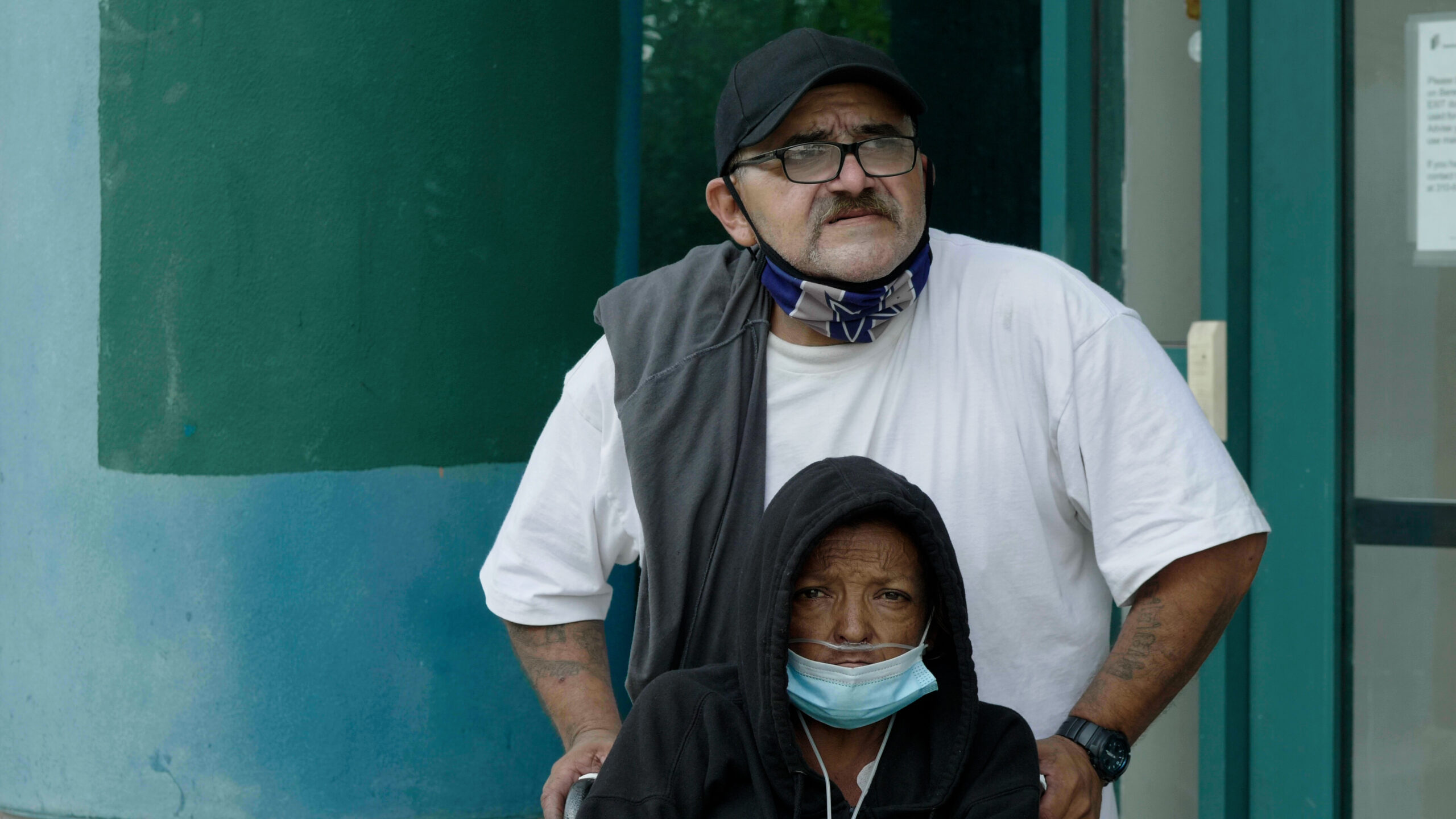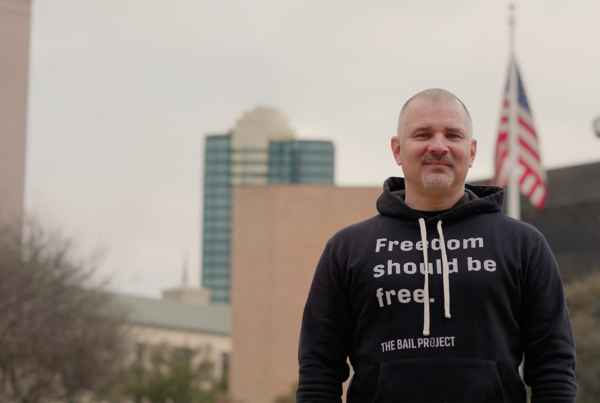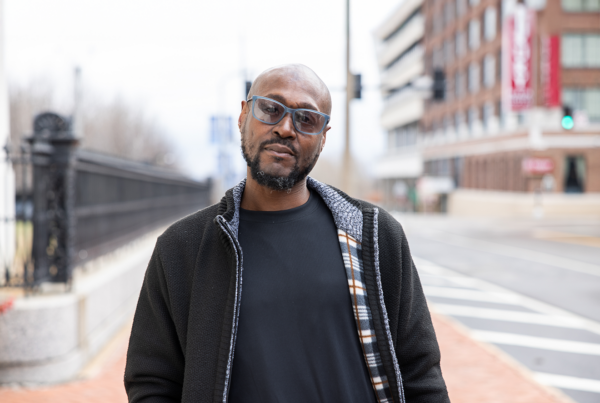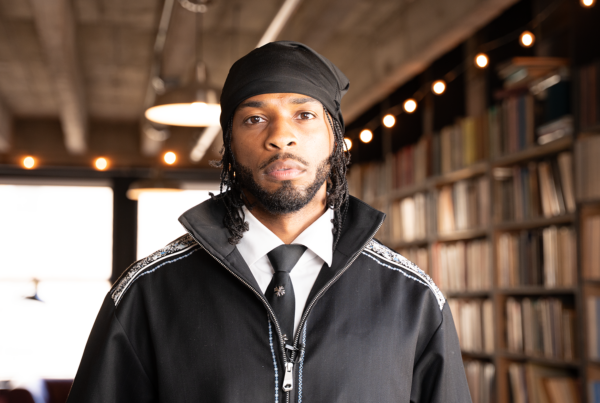Video Transcript
My name is Louis Salazar. I’m 57 years old. This is my wife Lupe. We’ve known each other since we were kids. We got together 2012 and we got married about maybe a month after we met. She has four kids, my stepkids. You know they’re still my kids no matter what. My boys started getting into arguments and fighting and stuff and I just started getting more and more frustrated. And that morning it was just, I just blew up.
To me that was shocking, cause I was in shock. For the whole six days I was in the county jail I was in shock. Begged her and begged her please get me a bail bonds, please get me out of here, get me out of here, I can’t be in here. You know, I gotta be home with you. I gotta make sure you’re okay. And that’s when she ended up in the hospital and I didn’t know. And I’m calling and calling and calling and I can’t get ahold of her. And that’s hard. It’s frustrating for a person to be in jail and not be able to do anything out here, you know, or to help your family.
Lupe’s been going through dialysis, for what, two years now. Her oxygen she has to be on constantly. I’m constantly moving her around, doing everything for her. And for me to be in the jail and her being out there, it scared me cause I didn’t know if they were really helping her. While he was in jail, I went into a diabetic coma. I thought I was gonna die. And I didn’t know what to do cause of my boys. Through my mind I was going, he’s never gonna come out. When he didn’t I said, God please make a miracle.
You know, and that’s when I had got a call from Priscilia. For me it was like thank god. This is the miracle I was waiting for. So Louis is actually a client of mine. I’ve been working with him since 2020. Cash bail detains people in pretrial detention before they’ve even been convicted of a crime. In California our bails are some of the highest bails in the country. Louis had a $100,000 bail. Luckily we were able to bail him out, but during that time he went through so much hardship even after being released. You think about these things and you think about, how could a system be so predatory? How is this not a violation of human rights?
When I got out and I seen her and I seen how she was, I was like I can’t go back to jail again. There’s no way. I was going to court, I was taking care of the things that I had to, then our house burned down. That’s what made it worse. The house that burned down was on Florence and Hoover. Right on the corner behind the car wash. After my release I came home, and I talked to my son, and told him you know what happened was wrong and should’ve never happened. Things started going good for us. He was helping me, we were doing our things together. I was working, doing my thing. And somebody brought in a vehicle and they were taking it apart, and one of the guys drilled a hole in the gas tank. The whole house just caught on fire. The only thing I was worried about was my kids and my family. My family was it. Everything got out, we got everything out in time. Mostly everything that burned was all material stuff. And we left. That was it. Four of us are living there. And it’s hard for me, cause I can’t live in the motorhome. It’s too hard for me because of my oxygen, my wheelchair, you know. And I just can’t. I feel irritated, I feel. But I gotta calm down. I gotta take it easy so I won’t get sick.
Our clients don’t deserve this. Our clients are regular people, they’re our community members, they’re our friends, they’re our family. Louis is you know sort of like the center of his family. And I just can’t imagine having a family member that’s sort of like the head of the household be put in jail and have to sit there for a case that’s gonna get dismissed anyways. Part of me was happy that they dismissed the charges, but to go through all this right now is bad. Her nurse, not her nurse, social worker she was getting mad at me because she was missing dialysis. And she said you know we got to think about her getting a kidney donated. I go, what do you mean? She says, well she’s going to need it real soon. I said, well what about me? She goes, you willing to do it? I go, well of course, you know it’s my wife, of course. But because I broke out with his thing on my leg, they’re gonna prolong it a little bit longer. You know because they don’t know if it’s in the blood. If it’s in the blood my kidney won’t be safe for her. It was staph from county jail. And they gave me antibiotics but when I got home it got even worse. Now I got this going on and it’s stopping us from doing what we got to do. I’m not gonna give up. I’m not gonna give up. She’s still gonna get it no matter what. She’s gonna get my kidney. No matter what.
Many incarcerated individuals are sole providers or primary caregivers to their elderly or sick family members. If they are arrested and unable to post bail, there’s often no one able to care for their loved ones at home. Louis and his wife, Lupe, share their story to explain how. Lupe has kidney disease and diabetes. Louis is her sole caretaker. She depends on him all hours of the day. When Louis was booked into the Los Angeles County Jail and held on $10,000 bail, Lupe was suddenly alone, bearing the brunt of this crisis. Bail amounts in Los Angeles are among the highest in the country. California’s average bail amount is $50,000, which is five times higher than the national average. Watch the video above to learn what happened next and how The Bail Project was able to help.
Thank you for engaging with our content. People like you make a better world possible – a world where justice is not determined by someone’s wealth. The Bail Project is not only an immediate lifeline for people held on unaffordable cash bail, but a growing megaphone for public education and social change. If you have the means and found value in our content, please consider becoming a donor today.











